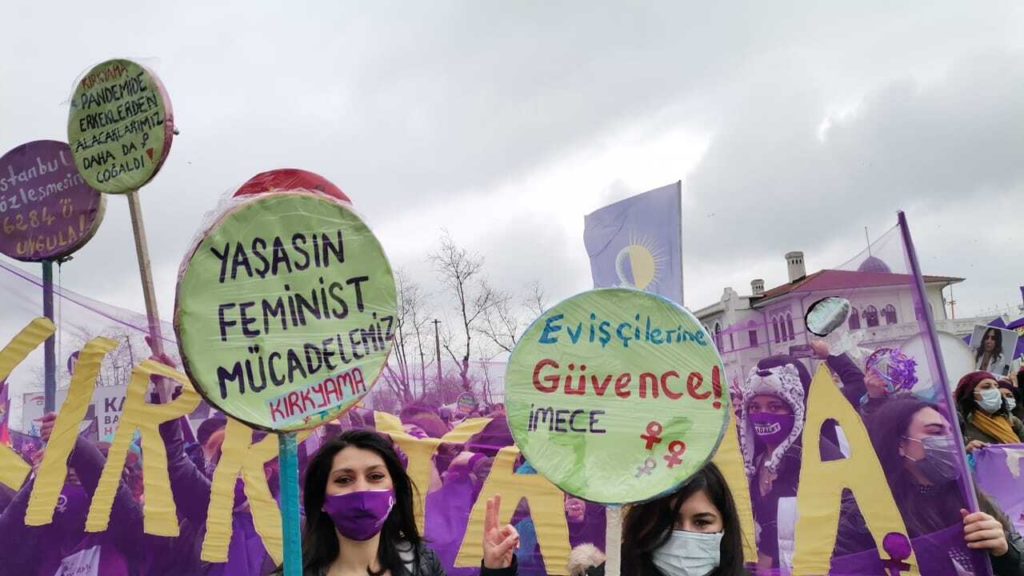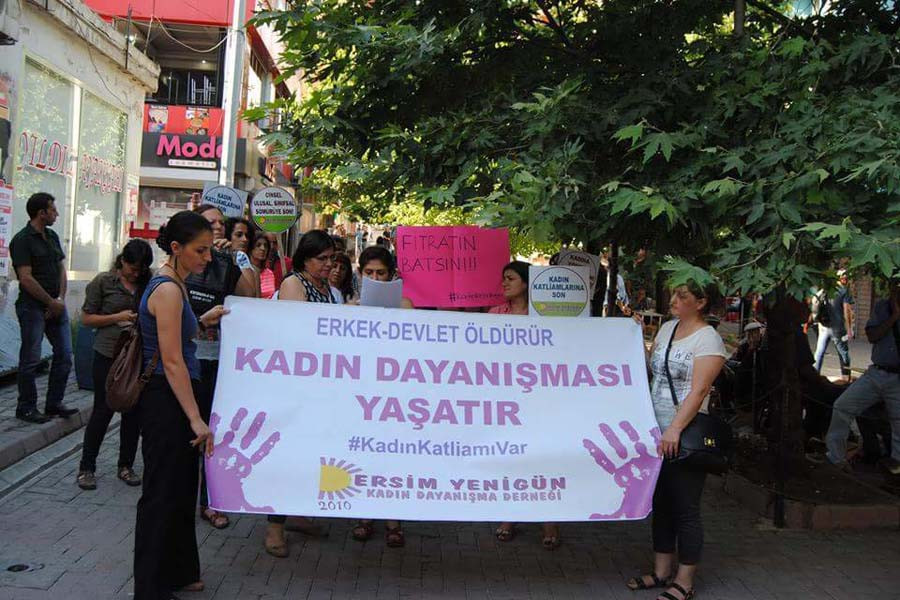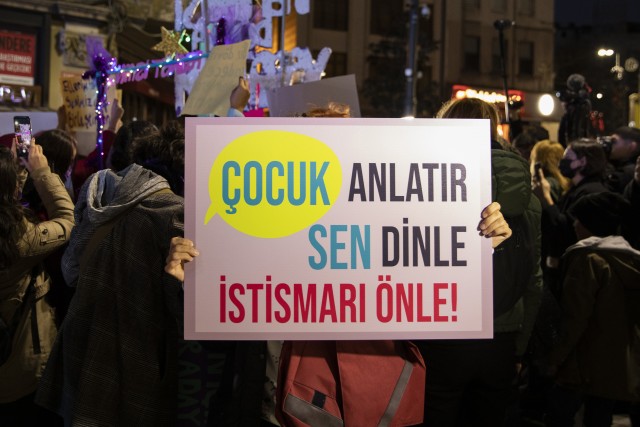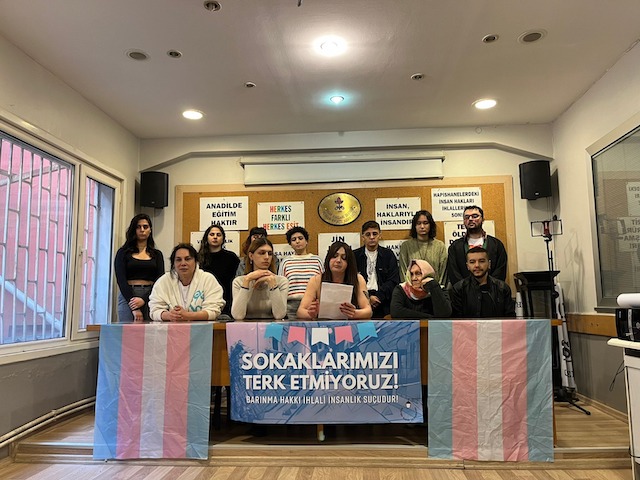We first heard about İmece Domestic Workers Union in early 2000s, but the movement has gained momentum with the Kurtköy accident in 2014. A group of domestic workers were waiting for the bus to get to work when a university student crashed their car into them. Three domestic workers lost their lives. The next day, the newspaper headlines read: “Wretched domestic workers dead.” Then, as reported by a union activist Sinem Atakul, the domestic workers organized and raised their voice: “We are not wretched cleaners. We are domestic workers, and we are forming a union!”
İmece Domestic Workers Union is focuses on guaranteeing social security and pension rights for, and ameliorating working conditions of domestic workers, and their inclusion in the labor act. Union activists Tülay Korkutan and Sinem Atakul told us about the process which led to the establishment ofthe union, their activities, problems faced by migrant domestic workers and the constrained working and living conditions of domestic workers during the pandemic.
Could you elaborate on your definition of the organizational structure of your union as “bottom-up, participatory and anti-hierarchical”? What’s the goal of İmece?
Tülay Korkutan: Before it was a domestic workers union, İmece was the Center for Women’s Studies and Solidarity. At the time, we used to talk about the need to organize, and if we were to organize, what kind of a women’s organization it would be. We were imagining a way of grassroots organizing, free from top-down politics, and hierarchy in its organizational structure. We wanted to do something for ourselves as women, with women without the backing up of or being a subdivision of an institution or an organization. I remember when I was a high school student at the time, there were councils that used to organize meetings. İmece councils used to meet once a week and women would raise their opinions there. If you disagreed, you had the chance to say so. Women used to bring up all sorts of issues to the floor, including their personal problems. The spirit of discussions was based on inclusion. We have been trying to establish and preserve that, inclusion, since then. We consider any woman a part of İmece as long as they identify as a member or would like to partake in action. We do not require formal membership to join our movement. Surely, we would wish they become members of the association or the union. We specifically work for domestic workers, with them. Domestic workers and activists comprise our union. We are mobilizing for social security and pension rights, ameliorating working conditions of domestic workers, and their inclusion in the labor act.
How many members of the union are there?
Sinem Atakul: We have members who are registered and others who are not; I believe there are around 300 formally registered members.
Why did you start organizing in Esenyurt?
Sinem: İmece Domestic Workers Union’s seeds were sown in Esenyurt in early 2000s; but the union is founded after the accident that took place in Kurtköy in 2014. A group of domestic workers were waiting for the bus to get to work when a university student crashed their car into them. Three domestic workers lost their lives. The next day, the headlines read: “Wretched domestic workers dead.” Then, as reported by a union activist Sinem Atakul, the domestic workers organize to raise their voice to say: “We are not wretched. We are domestic workers, and we are forming a union!”
Tülay: I could add a bit more on the Esenyurt incident. Esenyurt stands out as district where mostly poor and working-class people reside. It’s also a relatively new district. Surrounding the districts are Bahçeşehir, Esenkent, Ardıçlı Evler where luxurious gated communities are located. In those communities are women who work in plazas (tn. work centers, usually high rises where white collars work), and a lot of domestic workers. We don’t see many women’s organizations who focus on issues they are experiencing in this specific locale until the early 2000s. Therefore, the founding members of İmece decided to start their activities there. Esenyurt also has a politically receptive potential, the women believed that they could sustain their activities there. That’s when they decided to found the Center for Women’s Studies and Solidarity (KADMER). They set up İmece Women’s Cafe in 2003 and founded İmece Domestic Workers Union at a later stage. Let me tell you something remarkable about that time when we started working together, nobody used to say, “I am a domestic worker”. At the time, other definitions of the job were more common, such as gündelikçi [femme de ménage, with an emphasis on daily wage], temizlikçi [cleaner]. Reclaiming “domestic worker” is a result of another struggle we’ve led. At that point, İmece’s activities were not limited to Esenyurt. In 2006, Emel Çelebi shot a documentary called Gündelikçi. The film received first prize at Altın Portakal and Seoul Women’s Films Festival. Then, İmece’s journey took on another turn. As the movement grew stronger and its visibility increased, women started realizing that they are laborers. There was a shift in the language, too, from using gündelikçi or temizlikçi, they started to call themselves “workers”. They claimed their labor and how they are making ends meet with that.
Sinem: I believe the domestic workers became conscious of the following: I do the similar thing at my house, and now, I am getting paid for the same work, it’s not a problem. And in time, they started insisting on the fact that they are laborers; they claimed that terminology. I find that transformation rather remarkable. They were called “lady, sister, helper”, and for the most part they still are. It’s exactly that maternal relationship these names form that erases and exploits their labor. They are sometimes told “you are like a daughter to this household”. That sentence erases their labor in the same manner. After 2006, around 2008, we formed “Gündelikçi Women’s Alliance” to continue our struggle against the issues we have mentioned. One day, one of the members of the alliance asked , “Why don’t we form a union?” We formalized our unionization in 2014 and founded İmece Domestic Workers Union with 25 people.
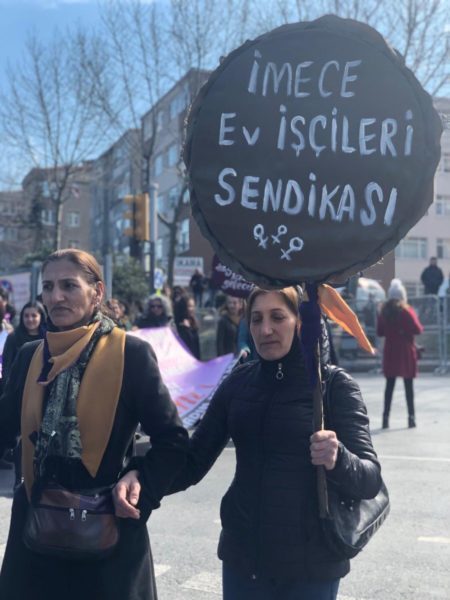
What are some priority issues for domestic workers? In the same line, how has the pandemic impacted them?
Sinem: From the very beginning of the pandemic, we started to have phone calls with our constituents as there were a large number of layoffs. Employers started to see domestic workers as the “carriers of virus”. Or they started to implement “no leaving the house” policy for migrant workers. Let’s look at what Seren Serengil has done- already swept under the carpet, too. When a migrant domestic worker wanted to leave her house, Serengil told her “You can’t, you will return home with the virus”. Then, Serengil and her boyfriend battered the worker. There were visual and audio recordings of the incident. They ended up leaving the domestic worker in the middle of the woods. As women of İmece, we were enraged at sight of this incident. We started to give statements to the newspapers and tried to keep in touch with one another. We had to find a way out of this situation. I should note that İmece is a member of the International Domestic Workers’ Federation (IDWF). We send them summaries of the news and interviews translated into English. During the Covid pandemic, our communication with them strengthened, and they wanted to hear more from us. The person in charge of IDWF in Europe told us about an international solidarity fund. It was a fund created by domestic workers membership fees from different countries to stand in solidarity with domestic workers in need worldwide. We set up a team and identified 76 domestic workers with most pressing needs. We called them one by one and interviewed them. Among them were women who had to leave their houses for their families or had to welcome their sister-in-law into their house after she experienced violence. Their lives were constantly changing. There were cases where women could not put bread on the table. Essentially, the situation was rapidly deteriorating. If you have an income directly integrated in the economy, you are among the most vulnerable group prone to be impacted by crises- poor to the point that you might lose your life… By conducting extended interviews, we tried to document domestic workers experiences during the pandemic. We issued a press release. Our founding member and companion to our struggle, MP Serpil Kemalbay shared the report with other MPs sitting at the parliament. In sum, the report highlighted that domestic workers could not even benefit from government or municipality sponsored relief packages. When we requested emergency relief from the municipality, we were faced with a lot of paperwork. When all the paperwork was submitted, I remember a domestic worker friend telling me: “Sinem, I don’t have enough money to go and pick up the package.” Some of these women don’t know how to read or write, or have no internet. The stages of integration to a middle class cannot be imposed on these women. What these women need is money, in cash. You cannot give them bulgur, when what they need is baby food.
Tülay: It would be fair to say that their choice oscillated between life and death. Domestic workers were left to their fate during the pandemic. We could only reach so many out of an estimated 2 million domestic workers in Turkey. They could not benefit from any of the “short time work pays” or relief packages. They were being exploited prior to the pandemic, but the pandemic has definitely aggravated their working and living conditions. Most of the domestic worker women do not have any security; most have less work or irregular working schedules compared to what they had before. The fundamental problem here is that it is left to the employer to decide if, or when, a domestic worker can work. The future of a domestic worker should not be left to one-sided agreements devised by employers. They should not be having to succumb to what will come out of the employer’s mouth. It’s not acceptable that the employers find the courage to say, “Don’t come over, there is Covid”. If there was a professional work relationship between the employer and the employee, the domestic workers could take a paid leave during this time. Or, if they were insured by their employers, they could at least receive unemployment pay. Currently, we are facing a situation where the domestic workers are forced to double their workload due to the pandemic and heightened concerns around hygiene. That means constant cleaning, and disinfection, which means doubled workload for them.
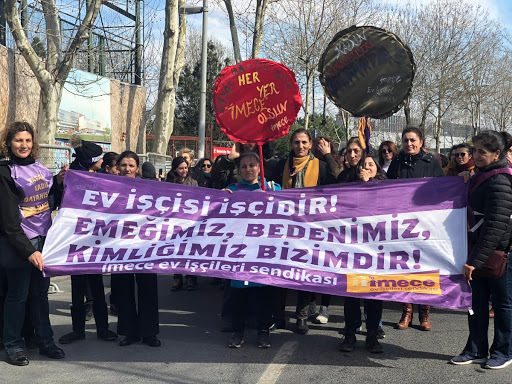
Bosses of cleaning companies are on the news as much as owners of the houses. Could you tell us about the types of exploitation we see in this industry?
Tülay: There are apps that connect you to firms that employ domestic workers. You can get price quotes from them. The companies don’t invest much in the system really, they effortlessly hire out the labor of domestic workers. We don’t even know if these offices actually exist. They have an online visibility over an Android application. It used to be that acquaintances would recommend acquaintances as domestic workers. This was helpful in the sense that almost everyone was recommended by someone else, so the domestic workers knew about the houses and what sorts of people lived in them. Or the employers recommended domestic workers to other employers. In the case of the apps, there are serious concerns around exploitation and harassment. There is no system in place to vet houses or employers that use the system. On top of that, if the company settles for 300 liras on the app, not even half of that amount goes to the domestic worker. The companies hold onto an unfair share. They are labor mongers of the industry. And the government does nothing about it, these companies come off as laborer hiring offices.
Would it be wrong to say that, today, most of the domestic workers in Turkey are migrants?
Sinem: We don’t have a definite answer to that. And the fact that we don’t shows us how rotten the whole system is. The official, or for that matter the unofficial, number of domestic workers cannot be determined. The inherent ambiguity is quite harmful since the industry is one of the worst ranking among rights violations. I work with a constructor whose wife is of Uzbek nationality. She takes care of a baby, while cooking and cleaning for a household. Imagine dumping three different professions onto one person, and only pay them 50-70 liras per day.
Tülay: The employers benefit from paying less. If one week they ask a domestic worker to keep regular hours, the other week they can demand they “don’t leave until this time, because I am busy that day”. That means not only does the domestic worker work a full day, but also face a threat to be notified to the police if she were not to agree to stay after hours. We need to be creating policies around these issues. Not just İmece, anyone who imagines a world free from exploitation needs to consider these issues. There is paramount pressure on migrant workers to remain sans papier during their employment. For others, the idea of becoming member of a union makes them anxious. A migrant domestic worker experiences twice as many problems than a domestic worker from Turkey does. Her passport might be confiscated by her regular employer. Let’s think about what that means. They can buy not only her labor but also all her rights. Or the scheduling of her leaves are up to her employer because they have the “deportation” card up their sleeve. Domestic workers don’t have the opportunity to talk about their rights. We already know that migrant domestic workers are rendered more vulnerable to harassment and rape. Let’s not forget Nadira Kadirova and what she has gone through before she was murdered. At the time, we were not able to hear her objections to the systems because our focus was elsewhere.
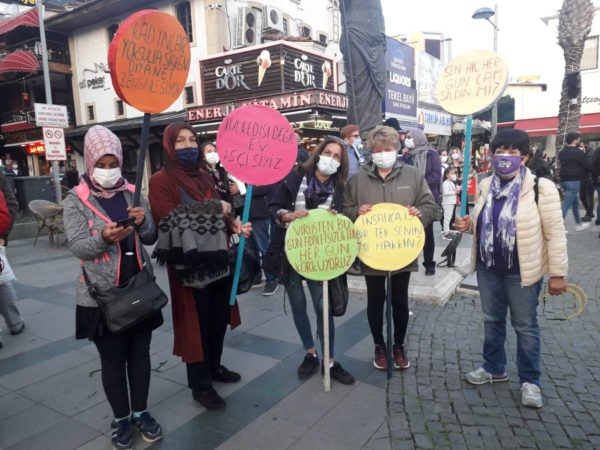
Media portrays the problems domestic workers face as “problems they create”, especially on social media. For example, when an electric vacuum cleaner breaks down, the domestic workers is held responsible. Where do you think lies the core of the problem here?
Sinem: Recently, we received a call from a domestic worker friend from Antalya. She was thinking about opening a court case against one of her employers. Apparently, the employer accused her of stealing a bottle of perfume worth around 1000 liras and filed a complaint against her at the police. She has been working for the same household for the past 15 years and lost her job after this slander. Upon this incident, she spoke to a lawyer and decided to take counter action. There is another case where an employer called one of our friends to ask whether she “stole my husband’s boxers?” The lack of a professional relationship between the domestic worker and her employer makes it easier for the employer to blame the domestic worker. You see that in TV series, too, where domestic workers listen in on closed doors; they are represented as gossipers, talebearers or thieves. Media is not free from this prejudice. Stealing, not stealing or trust don’t comprise the crux of our struggle really, because that’s the part appeals to the society’s conscience and compassion. But again, that’s not in the purview of our responsibility, nor is it our problem.
İmece is an organization for the “poor and working women” as you put it. What should people, who would like to stand in solidarity with you while in need of help with domestic work, be aware of?
Sinem: That’s not how we define ourselves- we call İmece an organization for women who are consciously impoverished by the system. Domestic work is not a women’s profession per se. If it formalizes as a professional sector, men will naturally become a part of it and the state will benefit from it. I am only saying that because that’s what the state cares about really. The state insists on identifying household belonging to women, imprisoning women to the domestic space. They want to keep domestic labor as women’s labor. They don’t want men to cook or take care of the elderly.
Tülay: This issue concerns us all. The pandemic has, once again, revealed the workings of domestic labor and gendered aspects of sharing it, and how it heavily relies on women. The fact that you have a white-collar job does not liberate you from that. As a women, you are left to take on not only your portion of domestic work, but also of other members of the household. No matter if you leave an online meeting, or a factory line, you have to cook, wash clothes, and, if you have any, take care of your children. The other members of your household do not see that labor or pay you for the work you undertake. If you are well-off, you can afford domestic workers. Generally, this reproduction process is built on the labor of women, and that’s where real exploitation starts. We had done a study that focused on employers of domestic workers, titled “Benim Güvenli Evim” [My Safe House]. I should add that states, as well as employers, should be held responsible for the workings of this sector. The struggle of a domestic worker is not a drama, it’s a struggle for attainment of rights. At a personal level, employers can contact İmece, and be mindful of the work they request and the working conditions. For example, they should not ask the worker to go over the windowpane to clean windows or insist on using heavy chemical-based detergents. Employer’s tasks should not exceed the standards. They should not ask a domestic worker to cook and iron clothes, then take the dog on a walk. They are all different sectors. Employers can provide insurance for domestic workers, but one thing is for sure, employers must pay them on time. Not getting paid on time, or never getting paid for that matter, are the most common problems faced by domestic workers. That’s where we become useful as a union. We phone their employers to tell them their employee is not alone, will be supported in her demand for her due fees. Do we have to organize press statements in front of their companies, or workplaces for them to hear us?
Sinem: We’ve been talking about insurance, but I can think of an incident where a domestic worker broke her arm, and 10 liras was cut from her pay for she had not worked a full day. You see that thei working conditions are in a constant state of bargaining. Unfortunately, in an unregistered sector, the possibility of bargaining also vanishes. They are constantly asked “200 is too much; can I pay 150?”. Or they spend the day hungry, the employer doesn’t think about providing a meal for the day. What we have to do at this point is not to appeal to the conscience of the employer but to work towards integrating domestic work into the labor act, so that domestic workers can have legal protection. The system makes women, the employer and the employee, confront one another. I would like to underline this point. In a lawsuit, we included the husband of the employee in the case, since he benefits from the cleanliness of the house, too. The core of the issue is recognizing the rights of domestic workers, and legally protecting these rights. I am saying that because we find employers buying the cheapest detergents and ask the domestic worker to mix it with another, and just by doing that putting the health of the domestic worker in danger without hesitation. They are asking domestic workers to undertake jobs they would not consider doing but expect to see an immaculate execution.
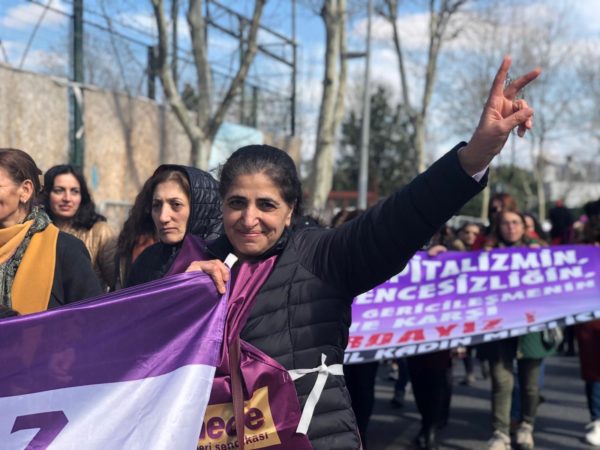
Are there people reaching out to your union to talk about the rights violations or exploitation they are experiencing? How can domestic workers who are not unionized reach you?
Tülay: We would like them to register as members, but most domestic workers don’t have insurance to qualify them for official membership. According to the unions act, for a worker needs to have an insurance registration number to become a union member. That surely works to our disadvantage. Nevertheless, we would like them to become members on E-devlet. Memberships are not approved by the Ministry of Labor, which can be considered a form of reporting to authorities. It’s a problematic situation where domestic workers cannot become members of the union because they don’t hold laborer status which is dependent on insurance registration. When you think about it, there is very small number of insured domestic workers.
Sinem: There is also the condition that before a domestic worker can register, her partner needs to give up their insurance, which means that they cannot benefit from health services for free and need to start paying a premium. With direct employment, domestic workers can, may be, retire after working 50 years straight. Considering the current labor act, domestic workers’ fate is left to the mercy of their employers. Employers can hire them for 10 days if they like, not 90.
Tülay: Despite all, domestic workers can visit E-devlet and become members of the union. They have to click on Union Membership tab and select Sector 20 (General). By doing so, they can become a member of İmece Domestic Workers Union. They will not be listed on our formal membership registry, but their contact information will be shared with us. They will be able to call us directly if and when they have a problem, and we will be able to call and consult them, like we did during the pandemic.
İmece Domestic Workers Union Address: Kervangeçmez Sokak, İnci Apt. No:10, Daire:7 Şişli-İstanbul Phone: 0212 596 81 59, 0506 253 6897, 0553 883 5785 E-mail: info@kadinlarinimecesi.org Twitter: https://twitter.com/imeceSendika |

